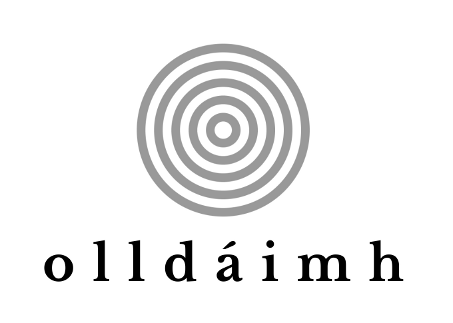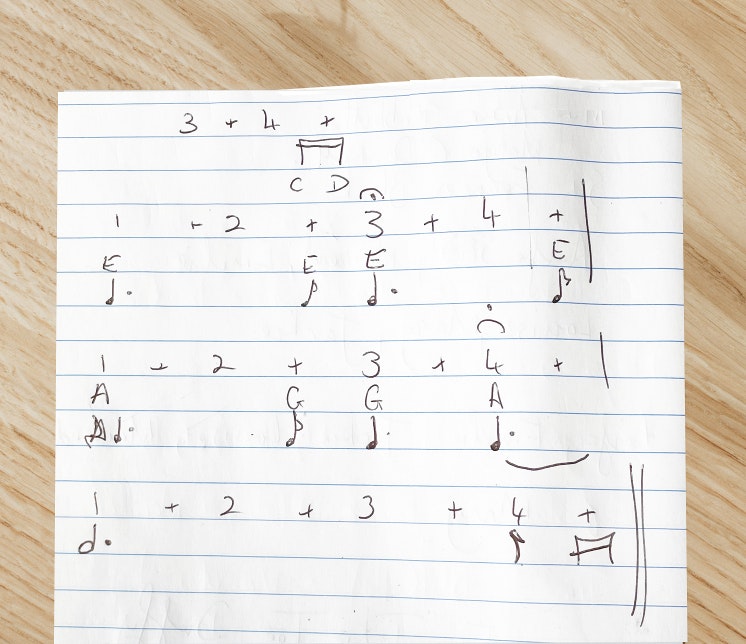olldáimh - the creation of the piece
The Title
In the days and weeks following the 7th of October 2022, I noticed something in myself -
- I wanted to be at home, in Donegal.
- I wanted to be around my family, my friends, my community.
- I started to notice on social media, that Donegal people who were in other parts of Ireland, or abroad, wanted the same things, to be back in their own homes and communities, among their family and friends.
Of course being from Donegal, we are spoiled by the beauty of our county and it’s only natural that we would want to always return, after all, we have a landscape that rises and falls, and bends and winds in all directions to shelter us and quilt us with protection.
But even if you’re not from Donegal, you will probably still feel this way about your own homeland and your own community.
I began to realise that there is a commonality within us all, a thread that draws us back to our roots in times of grief, and especially in times of unspeakable tragedy.
When I started to think about writing this piece of music I thought about those things. The importance of a sense of belonging to a place, and a sense of belonging to your family and people.
I then thought about our own individual sense of self, and our own sense of belief and faith in whatever it is we have faith or belief in.
That is when I realised that these four affinities, sense of belonging to a place, sense of belonging to a people, sense of self, sense of faith and belief, are universal, and these are where we go to find healing.
I needed a word for these four affinities because that word was going to be the title for this piece. One doesn’t exist in English, that I could think of or find.
If any language had a word for these four affinities, and one word for the four together then it would be Irish.
I contacted Áine Ní Churráin and she put me in touch with Mícheál Ó Domhnaill from the University of Galway, and with his help, he and I set about finding a word, believing that we would possibly have to create a new one.
The Aboriginal people and culture identified four principles or affinities in life, of connectedness and responsibility through caring, and unconditional love and responsibility. These four principles are collectively known as “Kanyini.”
I needed the Irish version of Kanyini. Mícheál trawled through old manuscripts going as far back as the 5th and 6th centuries, searching for words which would describe the definitions I gave to him.
Sure enough, our ancestors had identified these affinities, so much so that they created words to describe them:
Dúchas
affinity to a place, history, culture and heritage.
Fialas
affinity to a people - your family and community.
Anam
affinity to oneself including one’s spirit and soul.
Dóchas
affinity to faith, hope and belief.
For some that is a god or religion, for some it is nature, for others it may be something else. It is that sense of the ‘mysterious’ and the answers that have not yet revealed themselves.
Now we needed to find or create a word that would cover all four of these affinities.
Mícheál found an old Donegal word ‘dáimh’ originally meaning ‘affinity’ that hasn’t been in common use for a long time.
From there we both attempted to create a new word and serendipitously stumbled across what we thought was a newly created word ‘olldáimh’ which we translated as ‘great affinity.’
However, we quickly found out that we didn’t in fact create a new word, and that the word had been used once before but not since - in an ancient manuscript dating to the 1100’s.
Olldáimh is the term that encapsulates those four affinities as being four essential wells of nourishment and comfort to us all.

The Music
Central to this piece of music is Creeslough itself. The place, the community, the people, the moment, and all the other moments that have helped define it.
I wanted it to be the very foundation for the piece.
With that in mind, I wrote the alphabet out from A to Z.
Most of you may be familiar that music is based on notes named A,B,C,D,E,F,G; so I wrote out the seven notes under the alphabet, from A to G, and then wrote the seven notes again under the next seven letters from H to N and so on.
I spelled out Creeslough and that gave me the first ten notes of the piece of music: C D E E E E A G G A.

The entire piece is born out of those ten notes; the ten notes that spell Creeslough.
Those ten notes when played, sound like a calling. A cry. Like a calling out to its people.
Creeslough is embedded into the very music of this piece.
While Creeslough is central to this piece, at the very heart of this music, of all of this, are ten people, ten lives.
- Jessica Gallagher
- Robert Garwe and his daughter Shauna Flanagan Garwe
- Leona Harper
- Hugh Kelly
- Martina Martin
- Martin McGill
- Catherine O’Donnell and her son James Monaghan
- James O’Flaherty
Each individual life, each individual person, whose physical influence we can no longer feel, but whose spiritual influence, whose being, whose memory, shall live with their families, their friends, their community forever.
They too are each a part of this piece of music and I hope that their memory and their being is very much kept alive in this piece.
Likewise to what I did with the word Creeslough, I did a similar thing with each person and assigned each person with a note.
And so as we near the end of the piece, while it may sound like the piece is about to finish, ten notes will ring out.
Ten notes of equal length.
Ten notes played on their own without harmony.

Each note is sounded and then followed by a short silence.
The identity of those notes will not be revealed to the public and will only be revealed to the families.
As the piece nears to an end, the Creeslough theme is heard again, before finishing on the main body of the piece.
Olldáimh is the great affinity which describes the four affinities.
It is about your sense of belonging to your place; your sense of belonging to your family and community; your sense of your self and spirit and soul; and your sense of belief, faith and hope.
Olldáimh is about finding healing in those affinities.
Matt McGranaghan
olldáimh was first performed at the Donegal Association Dublin Gala Night on the 15th of April, 2023, when 'The People of Creeslough' were awarded Donegal Persons of the Year 2022.